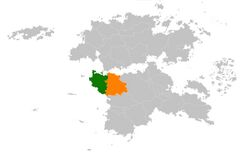Ruvelka-Syara Relations: Difference between revisions
(Created page with "{{WIP}} {{Infobox bilateral relations | title = Ruvelka-Syara Relations | party1 = Syara | party2 = Ruvelka | map = RuvelkaSyaraRelations.jpg | filetyp...") |
mNo edit summary |
||
| Line 17: | Line 17: | ||
The '''relations between Ruvelka and Syara''' has been characterized by hereditary enmity in the centuries since the fall of the Arkoennite Empire. Since achieving independence, relations between the two states have been dominated by frequent territorial disputes, economic and political competition, and direct conflict. Since the [[Unification of Syara]] in 1875, open hostilities and mutual tension have defined the state of relations, culminating in six major conflicts including the [[Syaran-Ruvelkan War]], [[Syaran intervention in the Ruvelkan Civil War]], the [[Siduri War]], the [[Imerti Conflict]], and the [[Zemplen War]]. | The '''relations between Ruvelka and Syara''' has been characterized by hereditary enmity in the centuries since the fall of the Arkoennite Empire. Since achieving independence, relations between the two states have been dominated by frequent territorial disputes, economic and political competition, and direct conflict. Since the [[Unification of Syara]] in 1875, open hostilities and mutual tension have defined the state of relations, culminating in six major conflicts including the [[Syaran-Ruvelkan War]], [[Syaran intervention in the Ruvelkan Civil War]], the [[Siduri War]], the [[Imerti Conflict]], and the [[Zemplen War]]. | ||
While defined by open hostilities over the past century, the aftermath of the Zemplen War saw both sides begin to normalize relations leading to what some observers have said is the most peaceful state of relations between the two in recent history. Much of the efforts for reconciliation between the historical rivals can be directly attributed by the foreign policies of Syara’s [[ | While defined by open hostilities over the past century, the aftermath of the Zemplen War saw both sides begin to normalize relations leading to what some observers have said is the most peaceful state of relations between the two in recent history. Much of the efforts for reconciliation between the historical rivals can be directly attributed by the foreign policies of Syara’s [[Kostadin Tonchev]] and Ruvelka’s [[Edviná Molnár]] whose respective administrations worked to finally re-established diplomatic relations. Kostadin and Edviná's successors–[[Radovan Kostović]] and [[Elsa Szekeres]], respectively–have continued to work on normalization and reconciliation. | ||
==Country comparison== | ==Country comparison== | ||
Revision as of 19:55, 15 July 2020
This article is incomplete because it is pending further input from participants, or it is a work-in-progress by one author. Please comment on this article's talk page to share your input, comments and questions. Note: To contribute to this article, you may need to seek help from the author(s) of this page. |
 | |
Syara |
Ruvelka |
|---|---|
| Diplomatic mission | |
| Embassy of Syara, Debrecen | Diplomatic Compound, Zovahr |
| Envoy | |
| Ambassador Deyko Bunev | Ambassador Erik Dudás |
The relations between Ruvelka and Syara has been characterized by hereditary enmity in the centuries since the fall of the Arkoennite Empire. Since achieving independence, relations between the two states have been dominated by frequent territorial disputes, economic and political competition, and direct conflict. Since the Unification of Syara in 1875, open hostilities and mutual tension have defined the state of relations, culminating in six major conflicts including the Syaran-Ruvelkan War, Syaran intervention in the Ruvelkan Civil War, the Siduri War, the Imerti Conflict, and the Zemplen War.
While defined by open hostilities over the past century, the aftermath of the Zemplen War saw both sides begin to normalize relations leading to what some observers have said is the most peaceful state of relations between the two in recent history. Much of the efforts for reconciliation between the historical rivals can be directly attributed by the foreign policies of Syara’s Kostadin Tonchev and Ruvelka’s Edviná Molnár whose respective administrations worked to finally re-established diplomatic relations. Kostadin and Edviná's successors–Radovan Kostović and Elsa Szekeres, respectively–have continued to work on normalization and reconciliation.
Country comparison
| Population | 163,520,400 (2015 estimate) | 177,432,650 (2017 census) |
| Capital | Zovahr | Debrecen |
| Largest City | Zovahr – 7,213,950 | Debrecen – 8,645,002 |
| Government | Parliamentary federal republic | Federal parliamentary elective monarchy |
| Official Language | Syaran (de facto and de jure) | Ruvelkan (de facto and de jure) |
| Current Leader | Executive Anita Beleska | Royal Princess Monika Prohászka Chancellor Elsa Szekeres |
| Main Religions | 97% Zobethos 3% other |
88% Vilageism 4% Arordi 3% Native Karvelebi 2% other 3% unaffiliated |
| Ethnic Groups | 30% Makedonian 28% Galanian 25% Scitarian 16% Hayrenkiy |
86% Ruvelkan 6% Hayer 5% Karvelebi 3% other |
| Expatriate populations | 369,655 (Estimated) | 377,659 (Estimated) |
| Military Expenditures | $70 billion | $62 billion |